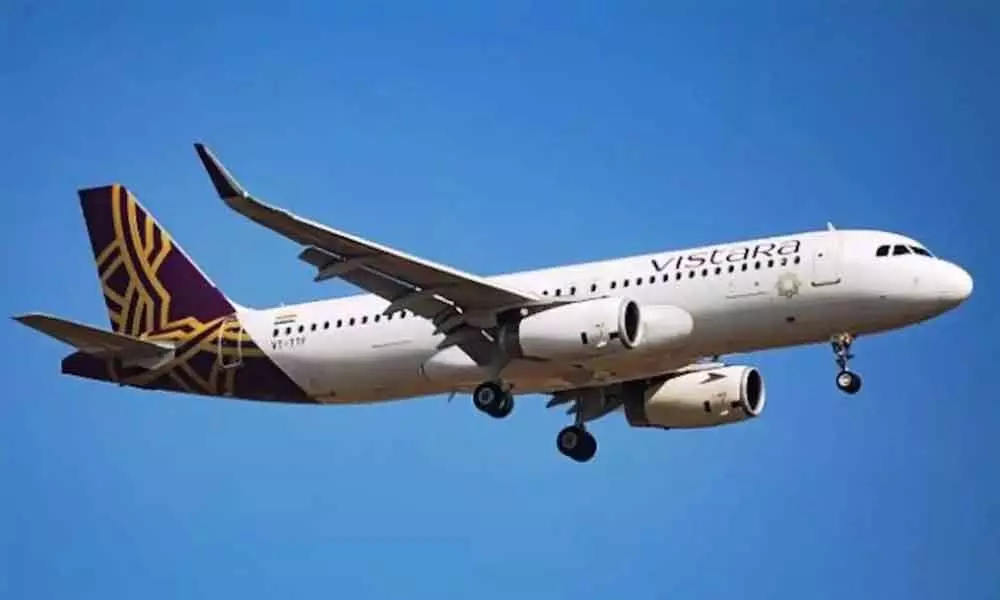Vistara expects regular international short-hauls in 3-6 months
Buoyed by the acceleration of anti-Covid-19 vaccination drive, Tata-SIA airline -- Vistara -- expects regular short-haul international operations to commence in the next 3-6 months.
image for illustrative purpose

New Delhi, March 19 Buoyed by the acceleration of anti-Covid-19 vaccination drive, Tata-SIA airline -- Vistara -- expects regular short-haul international operations to commence in the next 3-6 months.
Notably, the current international flights are operated under the 'Air Bubble' agreements between India and other countries.
This special arrangement mandates certain prerequisites along with permissions which are needed for passengers to undertake travel.
However, regular scheduled services by the airline were being undertaken during the Pre-Covid period to destinations like Singapore, Dubai, Colombo, Bangkok and Kathmandu.
In an interaction Vistara's Chief Commercial Officer Vinod Kannan told that it might take at least 3-6 more months to resume short-haul international operations within the subcontinent based on bilateral government approvals.
"While global rollout of the vaccine has begun in full swing, resumption of regular international air travel is still some time away," he said.
"Therefore, we feel travel bubble agreements will continue for a while and it may take us at least 3-6 more months to resume short-haul international operations within the subcontinent based on bilateral government approvals, while long-haul air travel may take at least till the end of the year to resume."
He said the airline is keen on long-haul direct flights operations from India and has been steadily growing its global network under travel bubble agreements.
In fact, the airline's six of the seven destinations were added during the ongoing pandemic, under travel bubble agreements.
"We are pursuing discussions with other like-minded global airlines for partnerships to be able to provide our customers an extended global network while strengthening our international presence."
According to Kannan, vaccines' rollouts have led to significant improvement in overall market sentiment and "given lot of hope to the industry".
"Especially in India, it has been very positive, given the country's role in controlling the spread of virus has been lauded by leaders from around the world,"
Besides, he cited the gradual but steady return of demand across customer segments.
"The passenger traffic, we see right now is a mix of people returning to their homes or to their cities of occupation, VFR (visiting friends and relatives) and business travel by SME owners and young entrepreneurs."
"As organisations increasingly embrace remote working, there might be a short to medium term effect on the demand for business travel."
Furthermore, Kannan pointed out that destinations like Goa, Srinagar and Port Blair have seen healthy demand lately.
"Our domestic network is our biggest strength, and our focus is to densify it further."
"We have been progressively mounting flights in our domestic network and are already operating at around 75 per cent of our pre-Covid capacity. However, we are witnessing a marginal drop in demand in March, mainly to destinations where new restrictions have been introduced in view of containing the spread of the virus."
In addition, he said that the airline's fleet expansion plan remains on track.
"We plan to have all six wide-body aircraft (Boeing 787-9 Dreamliner) in our fleet by 2022 and will continue to add more narrow-body aircraft including the A321neo."
"By 2023, we expect to have a fleet of close to over 70 aircraft."
The airline is a joint venture between Tata Sons and Singapore Airlines (SIA).
It had commenced commercial operations on January 9, 2015.
At present, the airline has a fleet of 44 aircraft, including 34 Airbus A320, two Airbus A321neo, six Boeing B737-800NG, and two Boeing B787-9 Dreamliner aircraft.

